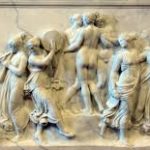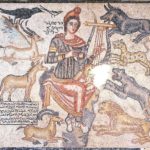Ancient Roman Glossary of Words: Ancient civilizations made the discovery that ideas could be represented by standard symbols that could be written down, painted on a surface, or pressed into wet clay somewhere between 5,000 and 6,000 years ago. The Sumerians used a stick whose cross section had either three or four sides to write their cuneiform letters on moist clay tablets that were later baked.
Ancient Roman Glossary of Words
In Roman Glossary, the Roman alphabet was derived largely from the Greek and was almost the same as the one we use today. There are some important differences, though, that can cause a lot of confusion for someone who wishes to casually study the language or read coin inscriptions.
Roman uppercase or capital letters
Romans wrote only in uppercase or capital letters with beautifully proportioned straight lines, curves, and angles until quite late in their history. In fact, the uncials or lower case letters were a medieval invention and could be seen beginning in the Fifth and Sixth Centuries, with a few examples dating a little earlier. Good examples of the fine style of Roman capital letters can be seen in the inscriptions carved with mallet and chisel into stone monuments.
In addition, there was no “J” in ancient Latin and the “U” was seldom seen and usually follows a “V.” The Romans wrote an “I” where we might write a “J” and pronounced it as a consonant with a “yuh” sound in these places. The “V” stood for our “U” and made a “W” sound where we might make the “V” sound reading the word in modern English.
Ancient Roman Words: Facts
During the early Roman Empire, a revolutionary change in the form of books and other written records took place. Though it did not seem at first glance to be such an important innovation, the changeover from books in the form of a rolled manuscript to a book that was bound along one edge was nothing less than an earthshaking.
For the first time in history, a reader could flip through the pages of a book instead of laboriously rolling a scroll from one hardwood stick onto the other in order to find the particular place in the text he or she was looking for. This saved the reader hours when it came to looking up information. Further, it also made it easier to keep written financial and legal records as well as account books of all kinds. This new format for the printed word was also more portable.
The pieces of cowhide used to make parchment could be much smaller now and the finished book was of a size that was a lot easier to carry around. Binding the pages together in this way made it possible to include a table of contents that would directly reference a chapter or an item of interest to a page number.
The Romans loved to have their portrait painted or a mosaic portrait made of them holding a rolled book or a wax tablet and stylus as they felt that these articles symbolized the education and cultured background of those who were shown holding them.
Ancient Roman Letters
In the Roman Glossary, for letter writing, there were different grades of papyrus, depending on whether it was an official imperial dispatch or a personal letter to a friend in a different province. The dry climate of Egypt was perfectly suited to preserving these ancient papyri as well as the parchment documents, though these tended to dry out and become brittle. The contents of some of the surviving documents found in Roman Egypt are much like letters that might be written today by those of us who found ourselves in similar circumstances.
Thus, the Romans used just 23 letters to write Latin:
A B C D E F G H I K L M N O P Q R S T V X Y Z
There were no lower case letters, and K, Y, and Z used only for writing words of Greek origin. The letters J, U, and W were added to the alphabet at a later stage to write languages other than Latin. J was a variant of I, U was a variant of V, and W was introduced as a ‘double-v’ to make a distinction between the sounds we know as ‘v’ and ‘w’ which was unnecessary in Latin.
Some of the ancient Roman words lists were as follows:
Bacchanalia – festival that celebrated Bacchus aka Dionysus
Balteus – Sword belt
Balnea Gratuita – free bath
Balneator – ran the bathhouses
Balneum – a small unheated bath house
Bibracte – A Gaelic province
Byzantine – Modern term for part of the ancient Roman empire
Plebians – These were the commoners of Rome and included farmers, soldiers, and merchants.
Republic – This was the form of government in which citizens have the right to choose their leaders.
Fido – faithful; usually kept as a dog’s name




